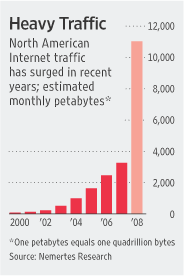
Source of graphic: online version of the WSJ article quoted and cited below.
(p. A1) The celebrated openness of the Internet — network providers are not supposed to give preferential treatment to any traffic — is quietly losing powerful defenders.
Google Inc. has approached major cable and phone companies that carry Internet traffic with a proposal to create a fast lane for its own content, according to documents reviewed by The Wall Street Journal. Google has traditionally been one of the loudest advocates of equal network access for all content providers.
At risk is a principle known as network neutrality: Cable and phone companies that operate the data pipelines are supposed to treat all traffic the same — nobody is supposed to jump the line.
But phone and cable companies argue that Internet content providers should share in their network costs, particularly with Internet traffic growing by more than 50% annually, according to estimates. Carriers say that to keep up with surging traffic, driven mainly by the proliferation of online video, they need to boost revenue to upgrade their networks. Charging companies for fast lanes is one option.
One major cable operator in talks with Google says it has been reluctant so far to strike a deal because of concern it might violate Federal Communications Commission guidelines on network neutrality.
“If we did this, Washington would be on fire,” says one execu-(p. A6)tive at the cable company who is familiar with the talks, referring to the likely reaction of regulators and lawmakers.
(p. A6) Separately, Microsoft Corp. and Yahoo Inc. have withdrawn quietly from a coalition formed two years ago to protect network neutrality. Each company has forged partnerships with the phone and cable companies. In addition, prominent Internet scholars, some of whom have advised President-elect Barack Obama on technology issues, have softened their views on the subject.
. . .
. . . Lawrence Lessig, an Internet law professor at Stanford University and an influential proponent of network neutrality, recently shifted gears by saying at a conference that content providers should be able to pay for faster service. Mr. Lessig, who has known President-elect Barack Obama since their days teaching law at the University of Chicago, has been mentioned as a candidate to head the Federal Communications Commission, which regulates the telecommunications industry.
For the full story, see:
VISHESH KUMAR and CHRISTOPHER RHOADS. “Google Wants Its Own Fast Track on the Web.” Wall Street Journal (Mon., DECEMBER 15, 2008): A1 & A6.
(Note: ellipses added.)

